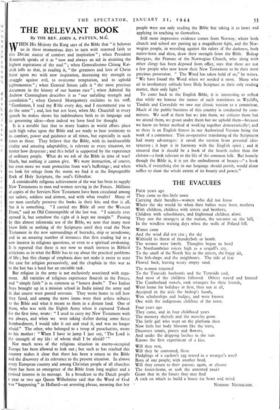THE RELEVANT BOOK
By THE REV. JOHN' A. PATTEN, M.C.
It is a notable fact that so many leaders in world affairs place such high value upon the Bible and are ready to bear testimony to its comfort, power and guidance at all times, but especially in such times as these. They believe that the Bible, with its inexhaustible vitality and amazing adaptability, is relevant to every situation, no matter how desperate ; and this belief is supported by the experience of ordinary people. What do we ask of the Bible in time of war? Much, but nothing it cannot give. We want instruction, of course, but even more we want protection from war's buffetings ; and when we look for refuge from the storm we find it in the Impregnable Rock of Holy Scripture, the soul's Gibraltar.
A considerable religious achievement of the war has been to supply New Testaments to men and women serving in the Forces. Millions of copies of the Services New Testament have been circulated among our sailors, soldiers and airmen, and with what results? Many of our men carefully preserve the books in their kits and that is all, but it is something. " I carried my Bible all over the Western Front," said an Old Contemptible of the last war. " I scarcely ever opened it, but somehow the sight of it kept me straight." Passing by this almost talismanic use of the Bible, we note that many men knew little or nothing of the Scriptures until they read the New Testament in the new surroundings of barracks, ship or aerodrome, and in an amazing number of instances that first reading led to a new interest in religious questions, or even to a spiritual awakening. It is reported that there is not now so much interest in Biblical criticisms as in what the Bible has to say about the practical problems of life ; but this change of emphasis does not make it easier to state the case for religion persuasively, and the chaplain in this war as in the last has a hard but an enviable task.
But religion in the army is not exclusively associated with argu- ment. All varieties of religious experience flourish in the Forces, and " simple faith " is as common as "honest doubt." Two Indian boys brought up in a mission school in India joined the army and in due course were posted overseas. They wrote home to tell how they fared, and among the news items were their artless tributes to the Bible and what it meant to them in a distant land. One of them, who was with the Eighth Army when it captured Tobruk for the first time, wrote: " I used to carry my New Testament with me always, and when we were taking shelter during some fierce bombardment, I would take it out and read it, and was no longer afraid." The other, who belonged to a troop of parachutists, wrote to his mother: " When I have to jump I just say, The Lord is the strength of my life: of whom shall I be afraid? "
Not much news of the religious situation in enemy-occupied Europe has been allowed to leak out ; but such as has reached this country makes it clear that there has been a return to the Bible and the discovery of its relevance to the present situation. In almost every European country and among Christian people of all churches there has been an emergence of the Bible from long neglect and a revived interest in its message. In a broadcast to the Dutch people a year or two ago -Queen Wilhelmina said that the Word of God was " happening" in Holland—an arresting phrase, meaning that her
people were not only reading the Bible but taking it to heart and applying its teaching to themselves.
Still more impressive evidence comes from Norway, where both church and school are putting up a magnificent fight, and the Nor- wegian people, in wrestling against the rulers of the darkness, both native-born and alien, draw their strength from the Bible. Bishop Berrgrav, the Primate of the Norwegian Church, who along with other clergy has been deposed from office, says that there are not a few people who now know their New Testament to be their most precious possession. " The Word has taken hold of us," he writes. " We have found the Word when we needed it most. Many who sit in involuntary solitude have Holy Scripture as their only reading matter, their only light."
To come back to the English Bible, it is interesting to reflect that while we honour the names of such translators as Wycliffe, Tindale and Coverdale we owe our classic version to a committee. Much of the public-business of this country is conducted by com- mittees. We scoff at them but we join them, we criticise them but we attend them, we groan under them but we uphold them—because we know no better method of working together democratically.; and so there is an English fitness in our Authorised Version being the work of a committee. This co-operative translating of the Scriptures had many advantages : it saved the version from personal idio- syncrasy ; it kept it in harmony with the English spirit ; and it ensured that it should be a book of the hearth rather than the cloister—a book relevant to the life of the common folk. But homely though the Bible is, it is yet the embodiment of beauty—" a book which, if everything else in our language should perish, would alone suffice to show the whole extent of its beauty and power."


























 Previous page
Previous page